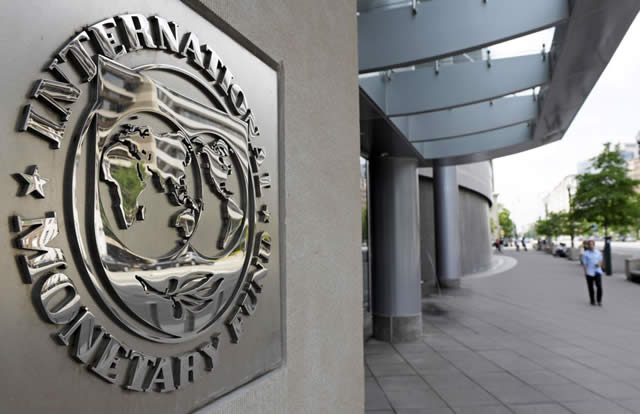
BY Kuda Chideme/ Tatira Zwinoira
The International Monetary Fund (IMF) has predicted that Zimbabwe would slide into recession this year, dampening hopes of economic growth in the southern African nation. Previous forecasts by the IMF had projected growth of at least 4,2%, but now the economy is seen contracting by as much as 5,2%.
Earlier projections had been based on the hope of a resurgent mining sector and an anticipated increase in foreign direct investment, but delays in implementing reforms and an imploding currency crisis have thrown everything off balance.
Drought-like conditions which have also affected agricultural output and a disastrous episode of flooding in the eastern parts of the country have left the nation in dire straits with at least five million people in need of food aid.
Labour and Economic Development Research Institute of Zimbabwe director Godfrey Kanyenze insisted on the need for government to implement structural reforms.
“Well, government has also indicated that they may also have to revise theirs (gross domestic product growth) as well. It is very simple and straight forward, it (IMF’s revision) is related to the El Nino-induced drought and the aftermath of Cyclone Idai. Also, as you know there is the role of the primary factors that have had an adverse effect on the economy and the shortages of foreign currency. As you can see, a lot of companies are closing as a result of the acute shortages of foreign currency,” Kanyenze said.
“So, it is the El Nino-induced drought that has had a very adverse impact, the issue of Cyclone Idai which has worsened the situation and the absolute shortage of foreign currency. These are just forecasts, predictions in terms of the weather, the foreign currency situation and reforms.
“If you go to the IMF article 4 report of 2017, it has got scenarios. One based on business as usual where there are no reforms, you can call that the baseline scenario and another one based on a reform trajectory. If you undertake successful reforms, ease of doing business, public and private sector reforms as have been mooted by the government, then your scenario in terms of what will happen next year and the year after changes completely.”
- Chamisa under fire over US$120K donation
- Mavhunga puts DeMbare into Chibuku quarterfinals
- Pension funds bet on Cabora Bassa oilfields
- Councils defy govt fire tender directive
Keep Reading
Economist John Robertson said: “I think that the IMF has more accurately measured the capacity in the country now. The fact is that we have not done any important work in investing recently and we still have constraints on the amount of investments that actually take off now. We have got a scarcity of money and a scarcity of investors with the confidence to come here and so we have not attracted the investment capital that would overcome our liquidity problems. And of course, we are still presenting a very uncertain future because of the number of constraints that are still imposed on new investors,” he said.
“All the licensing and permit requirements are still making the country very unattractive to new investors. When we compare the conditions offered by even neighbouring countries and of course there are countries all over the world wanting to attract investors we are not competing. So the investment environment is very attractive in some of those other countries compared to that which is very unattractive in Zimbabwe.
“I have spoken to people within the past few weeks. They said they wanted to build factories, but that they were going to build them in Botswana because if you are going to come to build factories, create jobs and exports we will give all kinds of benefits and attractive advantages which will make you very pleased you came to Botswana. In Zimbabwe, if you want to invest, you have got to pay for the privilege of being allowed to invest in Zimbabwe and you will pay for that with many permits and licenses…but the fact is that it is a very more hostile environment and I think that is what the IMF has picked up,” Robertson added.
Economist and former legislator Eddie Cross was, however, optimistic that the country would register subdued growth, ruling out a slide into recession.
“I think that they (IMF) are being too pessimistic. Mthuli (Finance minister Ncube) believes that we are going to get growth of 3% and I think he is right. I do not think the fund (IMF) understands the Zimbabwean economy. What do I agree with them is that I think we have got to recognise that what the government has done in the last year has been to shift the economy from consumer led growth path to export-led growth and the changes in monetary policy have emphasized that,” Cross said.
He added: “So, the exporters are in a situation where they are in receipt of very substantial premiums on export proceeds and this is going to lead to growth, export-led growth. But, clearly, if you boosted consumer demand by boosting incomes or reducing Paye (Pay As You Earn) or whatever it would have an immediate impact on growth. With export led growth there is a time lag because what happens is that you introduce the incentives and then it takes time before they kick in and result in exports.
“There is a lag between providing the incentives, assuring the exporters that the incentives are not temporary and that this is a genuine change in policy and the actual growth that will result in that. So, I think the fund has looked at that and said ‘look you are going to shock domestic consumption’. China is doing exactly the opposite by shifting from export-led growth to domestic demand-led growth and when you make a shift like that it changes the growth pattern. So, I think we are going to see growth, I don’t think they are right about the negative growth, but they are right in sense that we are going to see subdued growth until the export industry can respond to the export incentives.”
Last October, Ncube launched a 15-month plan which includes reform initiatives to revive the country’s sluggish economic growth, restore order to public finances after years of fiscal slippage and address chronic external imbalances that have left Zimbabwe with excessive date extreme foreign-currency shortages. The Transitional Stabilisation Programme’s projections target 6,3% in growth by year-end and before accelerating to 9,7% by 2020, starkly more optimistic than the IMF latest projections.







